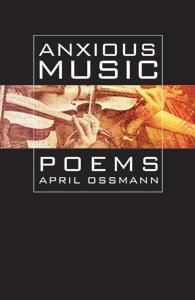Issue 2 - Winter 2010 Reviews Anxious Music Blood Dazzler Cities of Flesh and the Dead Crazy Love Cures and Poisons Dark Card and Mom's Canoe Fire Pond How to Live on Bread and Music Mister Skylight Paternity Perpetual Care Pictures in the Firestorm Rhapsody of the Naked Immigrants Rock Vein Sky Six Lips Slaves to Do These Things Slide Shows The Air around the Butterfly The Guilt Gene the nested object Interviews
 |
In keeping with April Ossmann’s slippery use of words and her “catch me if you can” voice, the closest Anxious Music comes to having a title poem is “A Kind of Music,” buried in the middle of the collection. This poem epitomizes Ossmann’s signature change in key, moving between major chords of playful, casual language and minor chords of more serious, reflective language. Just as in regular music, it is the insistence of regular measure which lends a firm yet flexible coherence to each poem, as well as to the collection as a whole. This is music which alerts the reader that the poems it orchestrates are to be read carefully, and read more than once or twice. “A Kind of Music” invites us to consider
The clipped line breaks and short line lengths, along with the largely mono or disyllable words and the contractions, are collectively calculated for speed. Although this piece is built on the linguistic equivalent of staccatos and sixteenth notes, it is also deceptively complex, and requires multiple reads to capture the high-speed wordplay and turns of meaning. The poem could almost been seen as describing itself when it goes on to ask us to
Ossmann does not let the music of her poems simply lift into any abstract shifts of air or thought. Rather, she grounds them in specific moments of every day life: from the grocery store check-out line in “A Kind of Music” to flipping through the dictionary on a Sunday morning in “Epergne,” a poem which also sparkles with wordplay and wit. She slows the poem down to a whole-note pace by infusing its variously long and short lines with abundant white space and letting it sprawl over two and a half pages, ever so slightly loosening the dictate of left-justified lines. As in “A Kind of Music,” Ossmann uses the full range of a given word’s various—and possible—meanings to build the central tension in the poem:
The speaker goes on to explore the possible insights which this found word may yield to her, wondering if “daisies or roses, trash or ashes” could be ensouled, and realizing that
This realization is far from the end of the arc that this poem takes, however. After this moment, the speaker goes on to probe more and ask more questions, indeed ending the poem with a question mark. No answers are final, no conclusions ends in themselves in this collection of poems, but rather invitations to look at objects and ideas from a different perspective, to find a different angle, a different answer, a different question. Just as the speaker of “Epergne” supposes the opposite of the meaning she finds in the dictionary: “ensphere—/what we think the head does to the spirit,/though it might be the opposite—,” the speaker of “Photo of the Artist With Chainsaw” also challenges the received idea of the interior position of the soul. In a stunning depiction of a man who is seeking trees to sculpt into figures with his chainsaw, we see a vision of art as the catalyst for such a profoundly literal baring of the soul:
But here Ossmann again shies away from a pat closure, choosing to end the poem by humorously depicting the effect of the catharsis—that the artist will seek out another catharsis—rather than holding the reader’s hand through an explanation of the event itself:
What if ensoul does not mean to endow with a soul? What if it means to turn something insoul out, to make something dance just as Edward Hopkins does to himself when he puts the chainsaw to the birch? What Ossmann says in “Epergne” is true: “I have not done what the poets have done/which is to give objects or words a soul.” Rather, her poems ensoul things in this last (if only posited) sense: they show what things truly are, as only art can. The collection’s first poem, “One,” for example, opens with the line “I wanted the avocados” and ends with “I steered my cart/down the market’s/gleaming avenues,” however, it is not about avocadoes in the usual sense. It is about avocadoes as they truly are:
After reading this poem, neither do I. Ossmann’s range is so wide, she can even show the act of washing dishes, with all its mundaneness, as it truly is: not mundane. In “Whose Fragile Lips,” she washes
Just as I no longer pass avocadoes with indifference, neither can I wash a wine glass without being reminded of how close to the edge we live, of how we must bear our fragility with strength: a delicate balance to maintain in any arena of life, and one often struck imperfectly. Ossmann explores life’s many arenas and their attendant imperfections with the precision of a surgeon and the sharp wit of a polished conversationalist. Eschewing perfect closure, her poetry achieves a fullness which matches the range of life as it truly is, from its quotidian depths to its delightfully soulful surfaces.
Reviewed by Christina Cook. |
